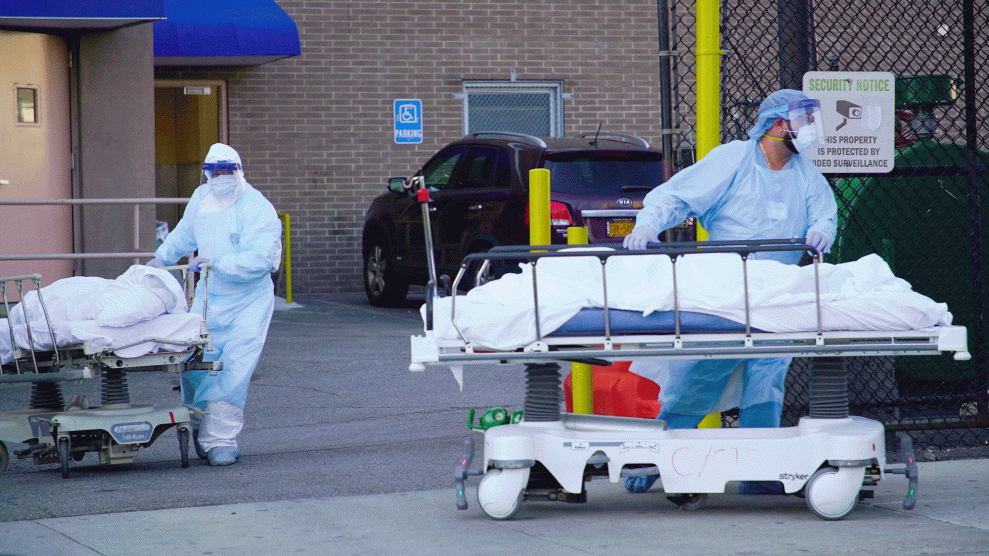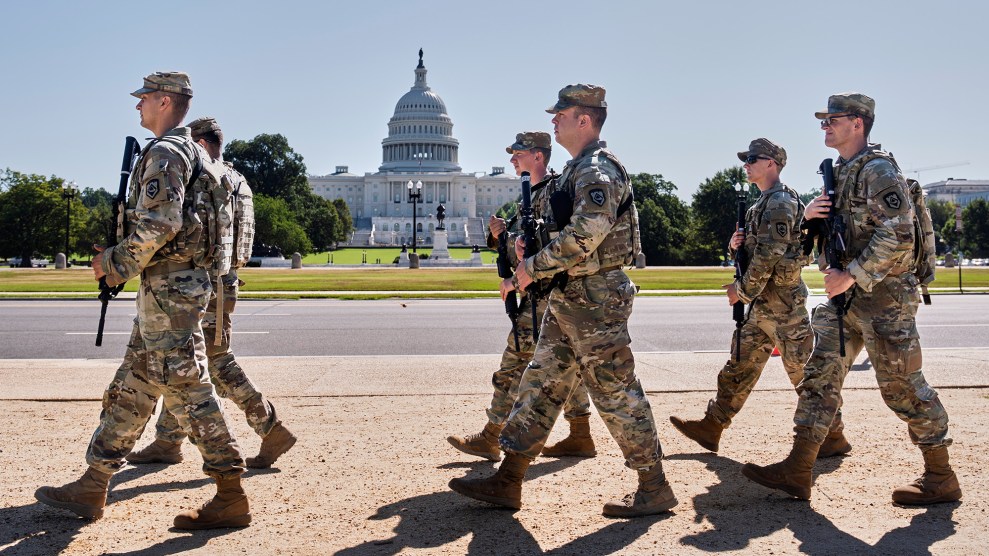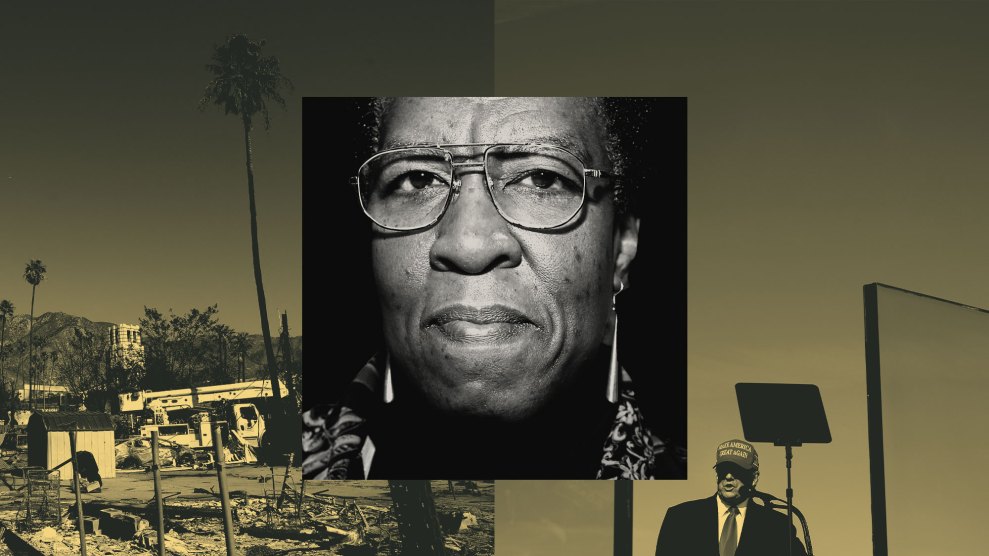
Hospital workers wheel out bodies to be stored in a portable morgue outside Brooklyn Hospital. Braulio Jatar/SIPA via AP
It was one of the most dramatic moments to occur in a congressional hearing room. On March 20, 2004, Richard Clarke, who had been the top counterterrorism adviser for President Bill Clinton and then President George W. Bush, testified before the independent, bipartisan 9/11 Commission. The audience included many relatives of those who had lost their lives in the horrific attacks of September 11. Clarke directly addressed these family members and did what is rarely done in Washington: He apologized. “Your government failed you,” he said, “those entrusted with protecting you failed you, and I failed you.” He added, “We tried hard, but that doesn’t matter, because we failed.” Two-and-a-half years after the attacks—and no one from the Bush White House had apologized and taken responsibility in this manner. (George W. Bush and Dick Cheney had even opposed establishing the 9/11 Commission). This highly charged moment was an unusual act of assuming responsibility. Months later, the commission would release a haunting and powerful report detailing the multiple US government failures that led to 9/11. It became a national bestseller and set a high-water mark in government accountability.
The United States could use such a soul-searching reckoning regarding the coronavirus pandemic that has claimed the lives of more than 555,000 Americans. Recently, Dr. Deborah Birx, who was the coronavirus response coordinator in the Trump White House, said that about 400,000 of these deaths “could have been mitigated or decreased substantially.” That is, errors, miscalculations, and policy failures on the part of Donald Trump and his administration resulted in a death toll nearly 140 times greater than 9/11. And yet, no apology. Moreover, the prospect of a full accounting of the Trump administration’s lethal handling of the pandemic also remains uncertain. But the American public—particularly those who have lost loved ones or suffered in other ways due to the pandemic—deserves a comprehensive evaluation that reveals who made what mistakes and what must be done to prevent a future calamity.
Last year, several members of Congress—Sens. Robert Menendez (D-N.J.) and Susan Collins (R-Maine), and Rep. Tom Malinowski (D-N.J.)—introduced legislation to create a COVID-19 commission in the style of the 9/11 effort. This outfit would have a broad mandate to investigate all aspects of the coronavirus crisis and how the US government responded—what happened with testing, interagency coordination, public health messaging, vaccine development, the production and acquisition of PPE, and everything else—and it would be granted subpoena power. But the bills went nowhere. In February new versions of the measure were reintroduced in the House and Senate. But their prospects are low. The Senate measure has five sponsors; the House version, two. Republicans in the House and Senate have generally signaled they are not going to sign on to anything that could be critical of Trump. House Speaker Nancy Pelosi has been pressing for an independent and bipartisan commission to investigate the January 6 attack on the Capitol, and Republicans have voiced opposition to that, trying to distract by calling for a wide-ranging inquiry that ropes in antifa and other bogeymen of the right.
The aim of these commissions would be to conduct bipartisan and independent probes viewed as credible by much of the public. Yet, as one top House aide said to me, if one party is not interested in such an endeavor—and wants to protect an administration from criticism—it is “hard to capture the magic of a bipartisan commission.”
In the absence of any commission for the coronavirus crisis, the job falls to Congress, and there are two congressional committees investigating various aspects of the pandemic. But it’s unclear if they will have the punch of an independent commission or be able to present a grand and overarching narrative about the immense blunders that yielded one of the greatest nightmares in the nation’s history. Yet both committees possess the potential to do so.
On the Senate side, the Homeland Security and Governmental Affairs Committee is mounting a COVID-19 inquiry. In early March, it sent bipartisan requests for information to the White House and a host of federal agencies, seeking, as the committee put it, to “analyze challenges and flaws in the federal pandemic preparedness and response efforts.” It also wrote to the National Archives to gain access to material related to the Trump administration’s response to the pandemic that was sent to the record-keeping agency.
The requests were detailed and extensive. For example, the committee asked the White House for “all documents and communications” referring to the “overall federal COVID-19 response, and coordination between the departments and agencies,” all documents “referring or relating to social distancing and other containment measures with respect to federal response planning,” all documents referring “to intelligence briefings” regarding COVID-19, and all communications between the White House and officials at federal agencies or the World Health Organization relating to the COVID-19 response starting in January 2020. It also requested a boatload of information regarding PPE, testing, and vaccines.
The committee is now “in contact with the administration and relevant agencies regarding our request and are working with them to provide answers to the American people,” a committee spokesperson says. The White House did not respond to a request for comment.
The committee has scheduled a hearing on April 14 on the Trump administration’s initial response to the pandemic. There is no word yet on whether it is aiming to produce a sweeping final report fully evaluating what happened on Trump’s watch regarding the pandemic.
Across the Capitol, Pelosi a year ago set up the Select Subcommittee on the Coronavirus Crisis. It was handed the mission of examining “the efficiency, effectiveness, equity, and transparency of the use of taxpayer funds and relief programs to address the coronavirus crisis.” This included investigating “reports of waste, fraud, abuse, price gouging, profiteering, or other abusive practices” and probing the federal government’s “preparedness for and response to the coronavirus crisis.” Essentially, it can look at any piece of the picture, including, as its website says, “any disparate impacts of the coronavirus crisis on different communities and populations.” Rep. James Clyburn (D-SC), the House majority whip, is the chair of the subcommittee, which is part of the House Committee on Oversight and Reform.
The select subcommittee has done a lot of digging into a wide assortment of pandemic-related subjects. It slammed large corporations that obtained COVID relief funds intended for small businesses. It investigated the disbursement of the PPP loan payments handed out by the Trump administration. It probed PPE contracts and sought to investigate alleged White House suppression of testing. The subcommittee recently released evidence that the Trump administration failed to address PPE supply shortages, even when warned of shortfalls. It examined political interference at the Centers for Disease Control, widespread coronavirus deaths and infections at meatpacking plants, and the ability of states to hold elections during a pandemic. The select subcommittee released documents showing that the Trump administration awarded a $250 million PR contract for an ad campaign shortly before the 2020 election to downplay the impact of the pandemic. It held a briefing with public health experts to examine actions that need to be taken to ensure the equitable distribution of coronavirus vaccinations.
The subcommittee has sent out its own document requests to the Biden administration for information on what the Trump administration did last year. And under the resolution establishing the subcommittee, it is obligated to issue a final report of some sort.
Though both the House and Senate committees are scrutinizing various slices of how the Trump White House managed—or mismanaged—the pandemic, there’s no telling yet whether either will be able to hold an investigation that ends up highlighting the whole dramatic and sorry tale. Will they stage attention-grabbing hearings with the officials who failed the public? Will they produce a report as sweeping and as impactful as the one crafted by the 9/11 commission?
The best investigations tell a story. They forge a narrative that spurs greater understanding of the subject at hand. That’s especially important when a tragedy has occurred. There is a need to fully comprehend the event—to come to terms with it—and to prevent a repeat or something worse. A bipartisan independent commission well-staffed and equipped with subpoena power would certainly offer the best forum for guiding the nation through this act of collective comprehension. But it takes two parties to be bipartisan. If the Republicans care more about protecting Trump, the Democrats on their own cannot conjure up such an endeavor. Their only course is to employ the existing mechanisms of Congress and leverage the power of these committees—conducting hearings, wielding subpoenas, issuing reports—to uncover and present a complete accounting. Probably without any apologies.

















